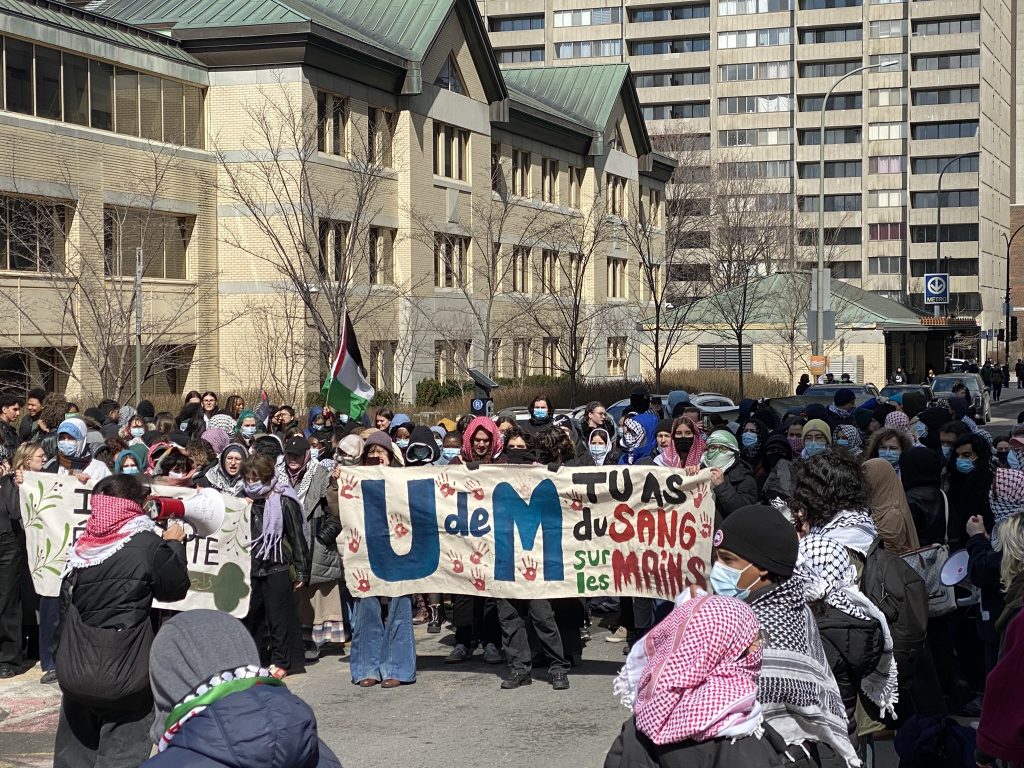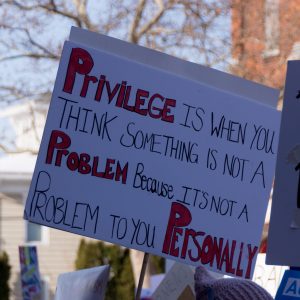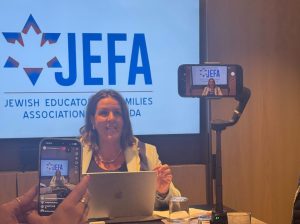The findings are worrisome, says Pascale Déry.
Quebec’s Minister of Higher Education released her report last week on the eight-month investigation into the “deteriorating” and “toxic climate” at two English colleges in Montreal.
The report, officially titled “Administrative investigation into the management of situations involving behaviour that could reasonably give rise to fears for the physical or psychological safety of students“, is a deep dive into the goings-on at Vanier and Dawson CEGEPs, particularly in the context of the Middle East conflict over the last 20 months.
The investigation included more than 50 in-person and virtual meetings with students, parents, faculty and administrators, board members, department heads, student associations and clubs, and analyses of documentary and testimonial evidence, highlighting issues surrounding academic freedom, student associations, religious accommodations, and tensions and conflicts between different student groups and between teachers.
Its findings include concerns about radicalization and politicization of student clubs, weekly “wear your keffiyeh” days, sales of “Long live the intifada” stickers, polarizing speakers, prayer rooms and questionable course content.
“These are very worrying findings,” Déry told French radio on June 27.

The investigation, says Déry, “highlights a series of failings that have profoundly undermined the climate in both colleges, fuelled tensions and weakened community life. As a government, we cannot allow our campuses to become the scene of divisions. Attending an educational institution in a healthy and safe environment is not a privilege; it is a right, and this right is not negotiable.”
According to the 78-page report, leaked to French media hours before its official release, the issues at Vanier and Dawson create “a climate of suspicion and the formation of cliques among professors. This situation can also have negative effects on educational services and thus generate tensions among students.” The report calls for “immediate action to preserve the physical and psychological safety of students, reduce areas of vulnerability, promote cohesion between all components of colleges and reduce sources of tension.”
Déry called on all stakeholders to take the recommendations in the report seriously and work together. “We will analyze the report rigorously, and if further action is needed to regulate or correct certain practices, we will not hesitate to do so.”
Prayer room problems
Garnering a lot of public attention is the highlighting of prayer rooms at both schools. At Vanier, for example, a Muslim prayer room features separations for men and women, and facilities for ritual washing. According to the investigation, the presence of prayer rooms is fuelling a climate of radicalization, community withdrawal and mutual mistrust within the CEGEP community. The authors cite two student associations in particular to this effect: the Muslim Students Associations (MSA) at Dawson and Vanier, and the Ardouna Palestinian Association at Vanier.
At Vanier, clubs subject to complaints included Hillel, MSA, Ardouna Palestinian Association and Islamic relief. At Dawson, clubs that were the subject of complaints, and whose combined cultural and religious aspects prevent “clear identification of their goals,” included the MSA, the Jewish Student Association, Solidarity for Palestinian Human Rights, and Islamic Relief—whose goal, per their Instagram bio, is “The official chapter of @islamicreliefcanada in Dawson College. A team of dedicated students paving the way for a prosperous Islamic homeland.”
While college prayer rooms are not directly subject to Quebec’s secularism law, says Déry, their presence is problematic and may need to be addressed. “We know that public institutions are subject to the principle of secularism,” which she says is “non-negotiable.” Students need an environment “conducive to learning, and that’s what we don’t have right now.”
Recommendations target academic freedom and equality
Most of the recommendations are applicable to all colleges: a law to regulate academic freedom; updating accreditation and financing of student associations and providing levers for establishments to intervene; reviewing the skills expected of language courses; and appropriate mechanisms to ensure compliance with and application of state secularism legislation.
Specific to Dawson, the report recommends a faculty member participate on the editorial team of the Plant student newspaper; and specific to Vanier, an official procedure regarding criteria for selection of guest speakers and themes addressed by participants at events organized at the college, particularly various symposia.
Those themed events received particular attention.
While the report notes that at Vanier College various events are offered throughout the year and student attendance is not mandatory, many students report being strongly encouraged to attend by teachers, some of whom offer extra grade points to attend. Those who don’t are left at a material disadvantage when it comes to university admission, as schools look at comparative R-scores to determine how well a student performed within their college cohort.
As reported in The CJN earlier this year, incentivizing students with bonus grades is common, and one particular Vanier teacher offered students an extra two percent on their overall course grade if they attended a lecture where Israel was called “an illegal colonialist project,” supported by a teacher who one student said characterized Israeli soldiers as Nazis, and symposium lectures began with calls for “right of return.”
Above: Hear how a Jewish playwright and Dawson College alumnus wrote a play about Zionism on campus that wound up being workshopped at his old school in the aftermath of Oct. 7.
The report also notes that Vanier acted to implement security guidelines for the annual Holocaust and Genocide Symposium “to anticipate and manage potential disruptions during the event.” The conference, which features visits from Holocaust survivors and testimonies about other genocides, on at least one occasion this year was targeted by an anti-Israel activist from outside campus who managed to get inside the building in an apparent attempt to disrupt the event. The CJN attended a discussion on the explosive rise of antisemitism in Canada this year at Vanier, where all students and visitors were admitted through a door that was kept locked throughout the presentation.
Additionally, the report cites a problematic repetition of conference themes that “monopolize debates in symposia to the detriment of other global issues affecting women,” citing the recent “Queer Activism and the Question of Palestine.” Some events were reportedly considered, for staff in attendance, as mandatory training hours for Sexualized Violence Prevention and Response on campus.
Déry insists she is not seeking to blame, but merely addressing problems that “have been going on for a long time… We have 48 CEGEPs, and things are going relatively well in all the others. These two have issues we must focus on, and find solutions, to return to a healthy and safe climate.”
The Minister acknowledges that she was heavily criticized by unions and some academics regarding her intervention in one of the classes during what she described as an “explosive” time. She questioned the utility of a French-language course focusing on Palestinian narratives and another entitled “Nakba“. “I asked questions,” she said. “If I had to do it again, I would do things the same way.” Déry has signaled that it may be time to open law 32, regulating academic freedom in universities, to colleges.
The first Jewish woman to hold a Quebec cabinet position, Déry had served for years before her political career on the board of the Centre for Israel and Jewish Affairs, which had called for action on campus, prompting anti-Israel demonstrators to label her as in service to “Zionist lobbies.”
In a June 27 joint statement from Dawson and Vanier, the two administrations noted, “While we are still in the process of conducting a thorough analysis, certain key elements are already evident.”
The schools reiterated that the report acknowledges their commitment to student safety, and “confirms that both our institutions identify and address problems in a timely and fair manner and that we offer various services to prevent, detect, and correct problematic situations when they arise.”
As for Dawson including a faculty member on the editorial board of the Plant student newspaper, “the practice had been previously discontinued at the request of the student association at the time,” says the statement, “and Vanier is welcoming the recommendation concerning procedures for selecting speakers and themes for events and is committed to its implementation.”
Vanier spokesperson Isabelle Moncion told The CJN that Vanier first learned of the investigation through the media, “and we received the report only a few minutes before it was made public. Despite this, we remain fully open to discussion with the Minister and her team.” Moncion says Vanier is committed to working collaboratively with the Ministry “to ensure our students continue to benefit from an excellent learning environment.”
Most of the report’s recommendations fall under the Ministry’s purview, she added; however, one specific recommendation for Vanier College involves developing clearer guidelines for selecting on-campus speakers. “We view this as a crucial project and believe it requires a consultative and collaborative approach with our entire community. We anticipate beginning this work in the fall, once our regular activities resume.”
In a statement to The CJN, Dawson director-general Diane Gauvin said the inconsistency of academic freedom and its implementation has been observed in many colleges, and that responsibility lies with the Ministry which has the authority to act. As for student association accreditation and financing, Gauvin says the CEGEP network has asked the Ministry to revise the act since 2012, “to no avail.”
She took issue with the recommendation to review expected competencies for language courses, saying there is “a lack of understanding about competency-based education,” and is unaware of any difficulty of courses to meet the competencies. “No responsibility lies with Dawson in this regard. The Minister approves the competencies of each program.”
As for secularism concerns, she said it’s unclear what the basis was for saying schools were not respecting articles of the law referring to separation of state and religions; religious neutrality of the State; equality of all citizens, and freedom of conscience and religion.
The report cited the exemptions, absences and other accommodations for religious holidays.
Gauvin says Dawson has three prayer rooms, for Muslim, Jewish and Christian students and that the Ministry wields authority to propose regulations governing or clarifying religious accommodations, which, she adds, are granted overwhelmingly to Jewish students. “If the decision is to prohibit accommodations, we will comply. For the time being, we do not consider being in violation of any policy, regulation, or government law.”
The role of the law
While current secularism legislation doesn’t ban prayer rooms on college campuses, the authors note their existence accentuates tensions and makes cohabitation difficult: “The assignment of a room to a particular religious denomination is considered a privilege, can be seen as proselytizing and is discriminatory against students belonging to other religious denominations. On the other hand, in a public college and in a secular society, one must question the relevance of a prayer room, particularly in the current socio-political context.”
At the March walkout at Dawson denouncing Déry’s investigation, a speaker told the crowd that Muslim student associations were targeted, with investigators “going into our prayer rooms for reasons undisclosed in this investigation, violating student privacy to prayer.”
The report also notes Vanier’s 2013 assertion that its Muslim prayer room, in place since the early 2000s, was an acquired right, something the authors dispute: “How can a prayer room be considered an acquired right in a college that must comply with (sections 2 and 3 of) the Act respecting secularism of the state, which stipulate that principles of secularism must be respected in fact and in appearance in government institutions; CEGEPs and universities?”
Gauvin says the role of higher education is not limited to the transmission of knowledge: “it also involves developing critical thinking, learning to listen to different perspectives, and challenging preconceived ideas. At Dawson, we firmly believe that the College must remain an open, inclusive, and stimulating space where respectful debate can take place, and where diversity of opinion is not only tolerated but valued.”
The report notes that Dawson did act once informed, about a student alleged to have participated in an online discussion forum for Quebec medical students that featured virulent misogynist, anti-Black, anti-Indigenous and antisemitic discussions and imagery, although the details of its intervention were heavily redacted.
A history of issues
Dawson is the downtown Montreal public college that famously shut down on November 21, 2024, during a “student strike for Palestine,” shuttering all its spaces, labs and facilities to 9,900 students and nearly 1,200 faculty and staff, citing an inability to guarantee safety of its students.
This, after a very fractious student vote which the Ministry said involved people voting more than once, voting without valid I.D., saw some faculty encouraging students to strike, and other technical difficulties; and after the school’s MSA posted warnings to strike opponents about the futility of their votes, and spoke about the “triumph of Islam” with references to caliphate and victories of historic Islamic conquests.
At the student walkout in March to denounce Déry’s investigation, which the report says was supported by the Dawson Student Union in breach of its duty of reservation, the crowd chanted slogans about divestment, Dawson’s “complicity in genocide,” repeated, “Glory to our martyrs, glory to the resistance,” and, “Pascale Déry, Israeli spy”.
A Dawson teacher speaking on condition of anonymity told The CJN on June 30 that a faculty member on the board of the student paper “may help prevent platforming of further questionable content, but won’t help if it’s one of the staff encouraging students to strike or platforming very anti-Israel material in classes and even participating in the protests. Look at all the marches around here: those boomers you see with keffiyehs aren’t all mature students.” They added, “It’s odd the report doesn’t look at the toxicity of teachers’ unions.”
In comments about classroom climate, the report cited one example where, in a distributed course plan, a teacher attempting to stimulate debate and inquiry wrote, “As a cisgender white man living in a colonial and racist society, you should specifically question what I teach you.”
One parent who saw the material called that “absolute lunacy,” telling The CJN, “What does this tell my straight, white, son sitting there in class? Something is wrong with him? This is not teaching, this is indulging pathetic little people with a little power who get cheap thrills on the backs of young people a few months out of high school.”
Quebec Premier François Legault, trailing far behind in polls with more than a year before the next provincial election, has signaled that a cabinet shuffle is coming, something Déry told the media makes no difference in the case of this investigation. “For now, I have a job to do,” she said on July 2. “It’s clear that this report will not be shelved.”
While much of Quebec’s political class, in full summer mode, is digesting the wide-ranging report before making specific statements or taking positions on it, Quebec’s Opposition Liberal critic, André Fortin, told The CJN, “We expect the government to react by proposing a concrete action plan to ensure a healthy, safe and supportive environment where everyone can thrive.”
Author

Joel has spent his entire adult life scribbling. For two decades, he freelanced for more than a dozen North American and European trade publications, writing on home decor, HR, agriculture, defense technologies and more. Having lived at 14 addresses in and around Greater Montreal, for 17 years he worked as reporter for a local community newspaper, covering the education, political and municipal beats in seven cities and boroughs. He loves to bike, swim, watch NBA and kvetch about politics.
View all posts







